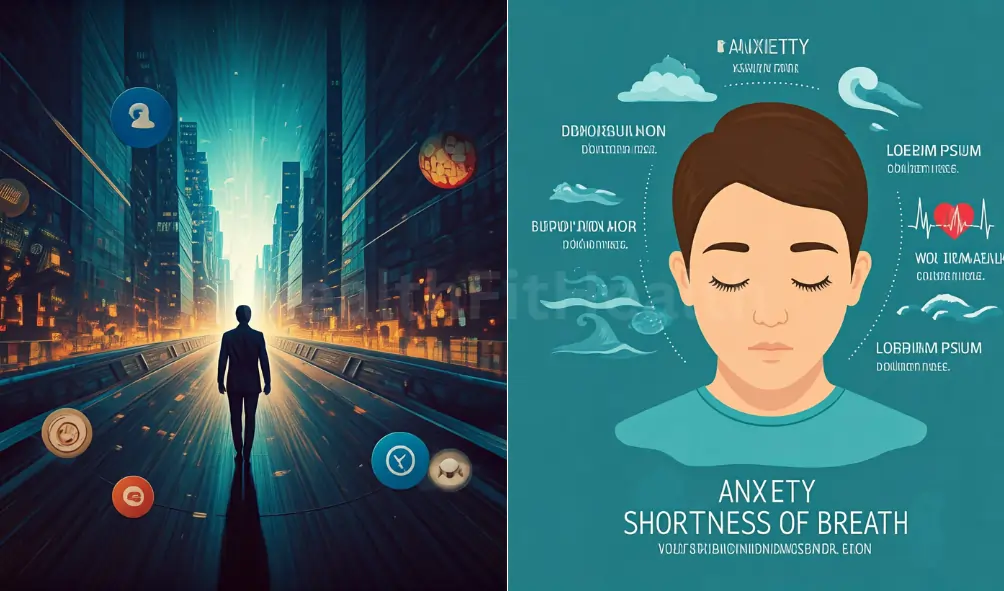How to Tell If Shortness of Breath is from Anxiety In 20s Era
Identifying Shortness of Breath Caused by Anxiety: A Comprehensive Guide
Dyspnea tends to be a somewhat fearsome experience. It is a medical term for shortness of breath condition diagnosed with varied causes other than anxiety. We are going to discuss in this article how one can get to know if their shortness of breath is due to anxiety and what they can do to help themselves manage these symptoms.
Anxiety-Related Shortness of Breath Physical Symptoms
Anxiety can leave you short of breath. You may feel:
1. Rapid breathing (hyperventilation)
2. Shallow breathing
3. Feeling as though one cannot breathe
4. Constriction in the chest or throat
5. Dizziness or lightheadedness
Psychological Symptoms
1. Fear or panic
2. Racing thoughts
3. Agitation or restlessness
4. Feeling burdened or stressed
How Anxiety Causes Shortness of Breath
Anxiety may stimulate feelings of breath shortness by
1. Hyperventilation:
when breathing is rapid and shallow, carbon dioxide levels fall; therefore, constriction of the blood vessels reduces the supply of oxygen.
2. Muscle tension:
The tight, throat, and diaphragm rest tightening ricts breathing.
3. Stress response:
hyperventilation and tachycardia during the body’s “fight or flight” response.
Differential Diagnosis of Anxiety-Induced Shortness of Breath
Find out whether the shortness of breath was related to anxiety by:
1. Chronology:
Does it occur before, during, or after the stressful event?
2. Triggers:
Is shortness of breath triggered by certain situations or thoughts?
3. Associated symptoms:
Do other symptoms of anxiety bother you, such as vibrations, trembling, or nausea?
4. Past medical history:
Diagnosis of any known chronic condition that could predispose to shortness of breath.
Anxiety-Based Shortness of Breath Treatment
1. Deep breathing: Use deep breathing in long motions.
2. Progressive muscle relaxation: This stops physical tension.
3. Mindfulness techniques: Try to switch off your mind through meditation or yoga.
4. Cognitive-behavioral therapy (CBT): Address underlying thought patterns and behaviors.
5. Medication: One should consult a doctor regarding possible medication options. Breathlessness is an annoying symptom, but with the knowledge of its relationship to anxiety, you shall always have been in a much better place handling it. If your symptoms are serious or have lasted longer than days, see your doctor. Learning to breathe easily and reduce the impact of anxiety on your life is achievable with the right approach.
Conclusion
Knowing how shortness of breath relates to anxiety is the stepping stone to its management. Anxiety and shortness of breath manifest physically with rapid, shallow breathing and chest constriction; while psychologically it manifests in fear, racing thoughts, and being overwhelmed. To find out whether your symptoms are related to anxiety, you need to consider when it happens, the trigger, and its consorts. Things like deep breathing, progressive muscle relaxation, mindfulness, and cognitive-behavioral therapy may be useful in managing your symptoms. If more serious or pervasive, seek medical attention to rule out other ailments that may be underlying. Anxiety-associated shortness of breath can therefore be coped with and worked on, with an appropriate approach.
FAQS
Q: What is anxiety-related shortness of breath?
A: Anxiety presents itself in short breath, every so often climaxing in physical sensations of not being able to breathe, fast breathing, and chest tightness.
Q: Shortness of breath from anxiety can be one physical symptom.
A: The symptoms are hyperventilation, a sensation of not being able to catch one’s breath, pressure in the chest, or throat; dizziness; or lightheadedness.
Q: What psychological symptoms does anxiety cause? Symptoms of breathlessness.
A: Symptoms may include fear or panic, inability to stop racing thoughts, agitation, or restlessness along with feeling overwhelmed and/or stressed.
Q: How do I know if the breathlessness was from anxiety?
A: Think about symptom timing and whether any symptoms of anxiety coincide with other symptoms.
Q: What should I do for breathlessness, anxiety-induced?
A: Advice to take deep-breathing exercises, progressive muscle relaxation, mindfulness techniques, cognitive behavior therapy, and medicine.
Q: When should I visit a doctor?
A: With the presence of other suspicious symptoms or those that are severe and persistent, ask for the elimination of other diseases by the doctor.
Explore Many Information.
